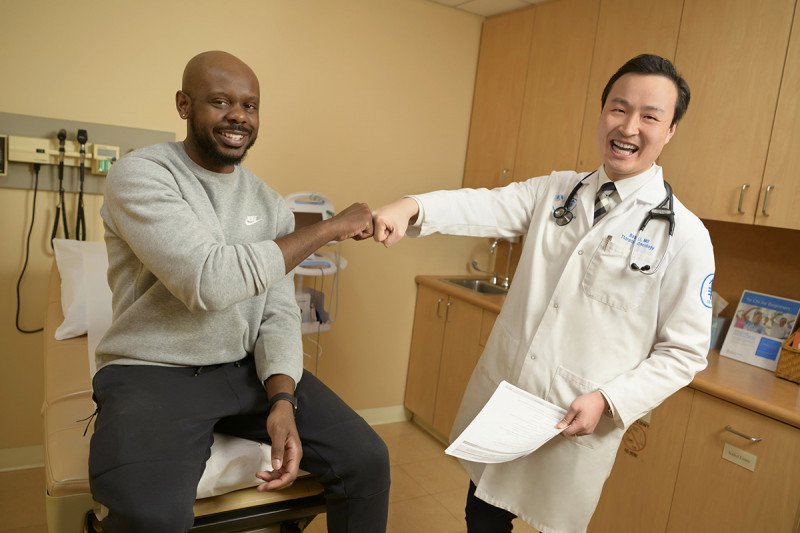
When 34-year-old Joey Laurore came to Memorial Sloan Kettering in 2017, he was looking for a second opinion. Doctors at another hospital had diagnosed him with stage IV colorectal cancer and were advising him to start chemotherapy.
At MSK, Mr. Laurore met with Bob Li, a medical oncologist specializing in lung cancer. To Dr. Li, Mr. Laurore’s cancer didn’t look like colorectal cancer on a CT scan. He wanted to perform a genetic test, but getting the necessary tissue from a surgical biopsy would take time.
Instead, Dr. Li ordered a liquid biopsy. This specialized blood test is designed to detect minute amounts of cancer DNA floating in a person’s blood. If such DNA is detected, it can be used to look for mutations that may be driving the cancer.
When the results of the liquid biopsy came back five days later, Dr. Li learned that Mr. Laurore actually had lung cancer. The tumors were being fueled by a mutation called an ALK gene fusion. This meant he was a perfect candidate for alectinib (Alecensa®), which is one of several targeted drugs specifically designed to block the growth of cells with ALK fusions.
“I immediately called and told him not to start chemotherapy,” Dr. Li says. “We agreed he should start taking the targeted drug instead.” It promised a much better outcome.
Liquid Biopsy Moves into the Clinic
Mr. Laurore, a corrections officer from Brooklyn, is one of a growing number of people whose cancer treatment has been guided by liquid biopsy as part of clinical research at MSK. Several liquid biopsy tests are now commercially available. The test that Mr. Laurore had is made by Resolution Bioscience. It looks for mutations in 21 genes that are known to be involved in non-small cell lung cancer. The test was recently approved for clinical use by the New York State Department of Health based on research conducted at MSK.
If a liquid biopsy detects a mutation, the person may be able to start taking a targeted drug immediately, often saving precious time that would otherwise be spent waiting for tissue biopsy results. (Liquid biopsy results take less than half the time of tissue biopsy results on average — nine days versus 20, according to a study by Dr. Li’s team published in the Journal of the National Cancer Institute.)
“The overall health of a person suffering from advanced-stage lung cancer can deteriorate very rapidly in the space of a few weeks,” Dr. Li says. “Sometimes you’re fighting against the clock.”
That was the case with Mr. Laurore. Prior to his diagnosis, he was very active and athletic. He enjoyed playing basketball in his neighborhood in Brooklyn. By the time he came to see Dr. Li, however, he had lost 30 pounds and was too weak to work. His lung cancer had spread into multiple parts of his brain.
Once he started taking alectinib, the turnaround was almost immediate.
“Within a week I was feeling better,” Mr. Laurore says. “I got my appetite back, and the fever stopped.”

Looking toward the Future
Research into liquid biopsies is forging ahead to make them more accurate and sensitive. Dr. Li and colleagues published the results of another type of liquid biopsy for lung cancer in the Annals of Oncology. The approach is called “ultra-deep next-generation sequencing.” The findings add to the growing evidence that these blood tests can detect targetable mutations from the tiniest amount of cell-free circulating tumor DNA.
Dr. Li thinks that liquid biopsy will eventually lead to big changes in the way people with cancer are treated. He’s already seen how it can benefit his own patients.
It’s been close to two years since Mr. Laurore started taking the targeted therapy. He’s back to work and playing basketball again. He’s even gotten engaged.
“Without this treatment, I probably wouldn’t have this kind of mind-set,” Mr. Laurore says. “But everything feels good. I feel normal again. Life goes on.”
The wedding is scheduled for July.



